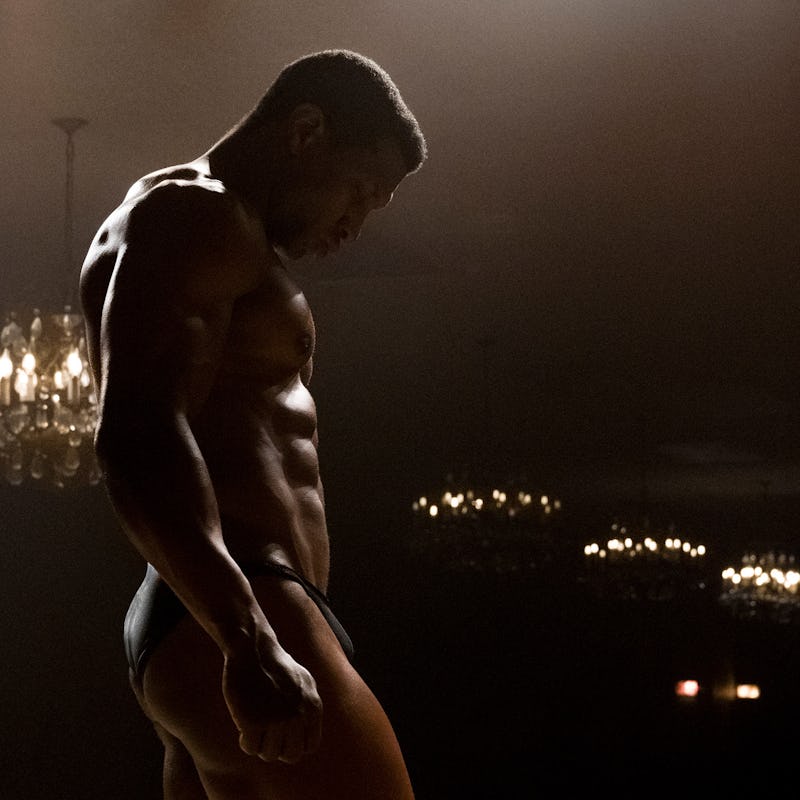Magazine Dreams is a New-Age Taxi Driver That’s More Muscle Than Meat
Jonathan Majors gives a blistering performance as a bodybuilder consumed by his obsessions.

It’d be easy to write Killian Maddox (Jonathan Majors) off as just another incel on the verge of a nervous breakdown.
At first glance, he is a personification of the worst gym rat you’ve ever met: the guy who can’t start his workout without a bump of cocaine and a shot of steroids, who can’t finish a set without barking in between each rep. But writer-director Elijah Bynum is not content with a one-dimensional portrait of a manic loner. He will not walk away until you understand Killian from the inside out, until you can sympathize with every choice he makes, every weight he racks. He digs his heels in until every outburst rings truer to what it actually is: an anguished cry for help.
Magazine Dreams is a film with a lot to say, and all of it rests on its hero’s hulking shoulders. Like so many obsessive men with an all-consuming hobby, bodybuilding is but a means to an end for Killian. His self worth is anchored in an unattainable standard of beauty, and echoed a thousand times over in the glossy magazine spreads plastered on his walls. He is more or less a stranger to a genuine connection, barring his relationship to his grandfather (Harrison Page), with whom he’s lived since he was orphaned as a child. His love is not as compelling as the validation from a pro judge, though — or the roar of a crowd, or the flash of thousands of cameras. So Killian trains. He binges. He purges. He sweats. He punishes himself in an endless cycle for a reward just out of his reach. When he flexes, it is not a show of strength, but a demonstration of an ideal, the pursuit of which is killing him.
As Killian, Majors joins the canon of outsiders making the slow retreat into their fractured inner world. But there’s one issue that makes him stand out from those who came before — the Travis Binkles and Lou Blooms and other portraits of the involuntarily celibate. Killian is a Black man in America, and that alone adds new layers to a story most already know by heart. That he worships white bodybuilders, and just about kills himself trying to emulate them, automatically makes a statement about attempts of assimilation, and how badly it can backfire in a nation engulfed in prejudice.
Magazine Dreams is most interesting when it brings Killian face to face with that truth, with his own mortality, and with his own Blackness.
Killian wants to be big, to be remembered — but he is made to feel small at every turn. He’s reduced to a stereotype by the woman clutching her purse at the meat counter of the grocery store. He’s stalked by cops while jogging through his neighborhood at night; labeled an incel by faceless critics on the internet. He’s fetishized by the pro bodybuilder he idolizes, and told that his deltoids are too small by a disinterested judge at a bygone competition — a comment that will inspire one of the film’s most brutal (and exhilarating) confrontations. Perhaps more than any that have come before, Killian is a paradox: a pariah with no place in the world.
Magazine Dreams is most interesting when it brings Killian face to face with that truth, with his own mortality, and with his own Blackness. It’s better still when it alludes to the inherent queerness in the sport that Killian’s chosen. Unfortunately, there’s a lot more that Bynum wants to cover before the credits roll — and it doesn’t all work to the same effect.
The comparisons to Taxi Driver and Whiplash spell out one thing for Bynum’s tragic hero: destruction. Killian doesn’t want to play into people’s expectations, or their fears — not at first, anyway. But there’s really only one way a story like Killian’s can go. Every altercation and failed social interaction hint towards a point of no return. Each gym session and failed competition brings him closer to the ninth circle of hell. An irrevocable act of violence is all but imminent — and after cycling through an endless circuit of dread and disappointment, it might have been a welcome change. Bynum, however, would rather not play into the ending we all expect. He wants badly to vindicate Killian, to pull him back from an act he might regret. But in doing so, he fails to subvert his story in a way that would show us anything new. Magazine Dreams circles so many topics that it struggles to find a place to land in the end. After an efficient first half, the film devolves into a speed drill, zipping through ideas and themes — and trauma, so much trauma — without fully committing to any of it.
It helps that Majors is committed enough for them both. He holds everything together with a Herculean resolve, and his blistering performance is just enough to distract from what becomes an aimless plot. He projects an innocence in Killian, a naivete and a raw, aching loneliness that's impossible to discredit. It makes the story’s bravest comments (and its cruelest developments) hum with an electricity that’s sure to manifest into awards buzz down the line. But is it enough to redeem the film from what it is? Or will it, in the end, resemble Killian’s empty flex: not so much a demonstration of strength, but a shallow exercise in the tortured, maximalist tragedies that have captivated us in the past?
Magazine Dreams premiered January 20 at Sundance.